How to Avoid Soup Boiling Over
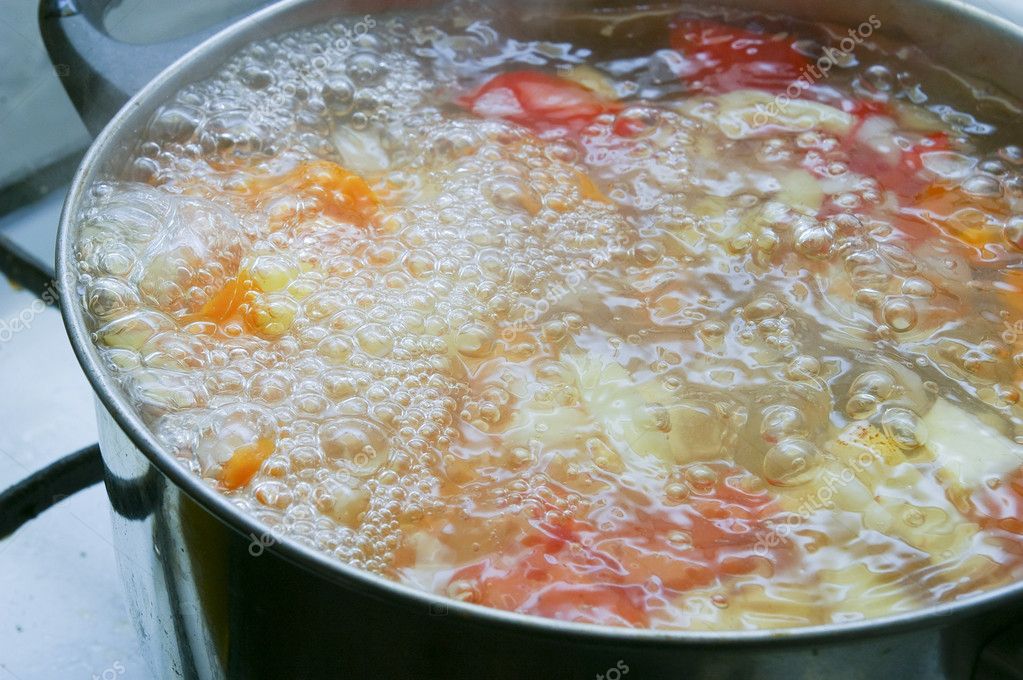
A pot that is constantly watched never boils, and a pot left alone, on the other hand, appears to boil over as soon as you turn your back. So, if you’ve ever wondered how to keep soup (or any other boiling liquid) from boiling over, I’ve got a solution for you:
Avoid using wooden spoons on your stovetop to prevent boil overs. Salt is necessary for many dishes, and it does not prevent boil overs. Although adding oil helps to avoid them, this may not be the case with all flavors. The ideal approach is to use a boil over preventer disc or a silicone spill stopper.
But there’s a lot more to discuss, including whether or not a wooden spoon is actually helpful. So let’s get this party started!
On the stove, we all despise boil overs.
It leaves us with a massive mess on our hands. And you won’t be able to do much about it until the burner cools down. This is especially aggravated if your stove top is made of coils rather than glass or ceramic.
It’s especially vital to avoid a boil-over if you’re making your soup with an immersion blender. Splatter can be reduced to some extent with immersion blenders, and you will, however, be burned if the soup is boiling.
So, how do you keep boilovers at bay?
Continue reading to learn more!
Is a wooden spoon effective in preventing boilovers?
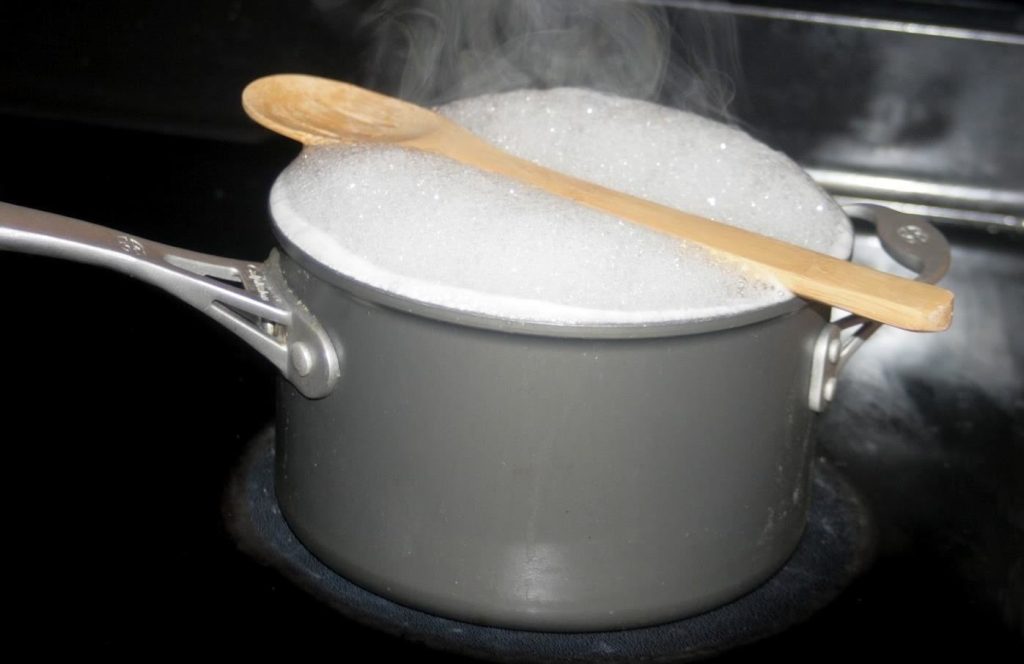
No. A wooden spoon placed on the pot’s rim will not prevent it from boiling over, but it will lower the risk marginally. Despite the frequency with which you see assertions of this on social media, there is no scientific evidence that this prevents boil overs.
You’ve probably seen the image of the spoon over the saucepan if you use social media. You’ve probably also heard that putting a wooden spoon on top of a pot of water will keep it from boiling over. There doesn’t appear to be any scientific evidence that this is effective, and it didn’t work for me the first time I tried it.
I did come across some anecdotal evidence that it helps. To be honest, I’m dubious about this.
For a fraction of a second, it may prevent a boil over. However, unless you keep a close eye on the pot, you won’t be able to get to it quickly enough to prevent it from boiling over. I also believe that many who share this on social media are not filling their pots to capacity, which prevents boilover in the first place.
As a result, I’m classifying this as primarily an urban legend. However, give it a shot and see if it works for you.
The spoon appears to be natural wood and quite large, based on what I’ve observed. Before the water begins to boil, place it in the pot. The spoon will modify the surface tension of the water, causing any bubbles to rupture before the water boils over.
Is it true that salt prevents water from boiling over?
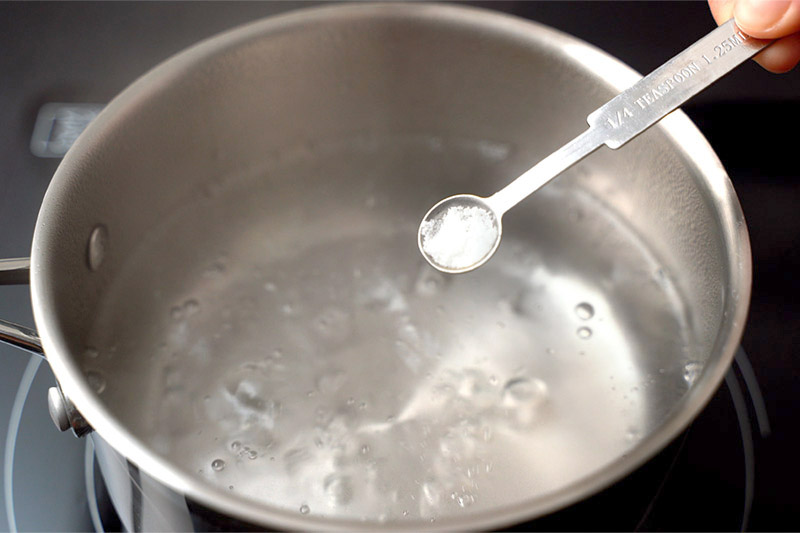
Salt does not only prevent water from boiling over, but it actually accelerates and intensifies the boiling process. The purpose of salting water is to add taste and speed up the boiling process. Even if it’s only a matter of seconds. It does not, in any way, prevent a boilover.
Salting cooking water for just about anything is second nature to those of us who know our way around a kitchen. The reason for this is because it aids in seasoning whatever you are preparing.
Hard-boiled eggs are one thing for which I do not salt the water.
The egg isn’t exceptionally flavorful when seasoned with salt. And, as previously mentioned, salt might help the water boil faster. We don’t want to boost the water temperature too much because eggs should be boiled at a low, moderate boil.
What’s the best way to protect milk from boiling over?
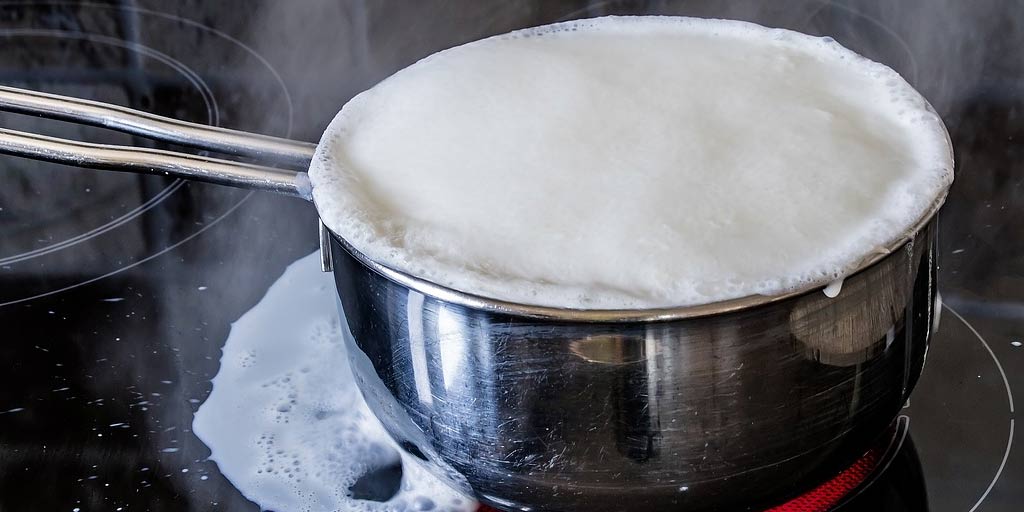
Because milk boils faster than water, the best approach to keep it from boiling over is to keep an eye on it and reduce the heat as soon as possible. Stir it frequently as well.
The speed with which milk boils over can astound you. There are only a few bubbles dancing around the pot’s edge at first. Turn your back for even a second to do something else. You’ll undoubtedly hear milk sputtering and hissing all over your hot burner.
Milk, as previously said, boils faster than water.
As the milk heats up, the surface layer thickens, forming a film. Because the film causes steam bubbles to grow beneath it, you can’t see what’s boiling beneath it. The steam and foam are suffocated. The water vapor eventually seeps through, causing the milk to boil quickly.
Stir the pot every few minutes to avoid this rapid emergence of milk over the stove. This will help to split up the surface temperature and ensure that it heats evenly. It will also assist in keeping it from catching fire.
The bottom line is that you should never leave a saucepan of boiling milk unattended!
Is it true that oil may prevent water from boiling over?
Yes, using oil to keep water from boiling over is a good idea. Because oil floats on the surface of the water, it disrupts the boiling process and prevents the water from foaming up. As a result, the water boils slowly and does not climb above the pot’s rim.
Water, on the other hand, prevents flavors from clinging to pasta and other foods. So, if you’re making spaghetti, all of the sauce will slip off rather than absorb into the noodles. I understand how tempting it is to drizzle oil over your spaghetti.
Especially if you’ve been using it to keep your noodles from sticking together for a long time, pasta is quite starchy, so when it boils, it foams and boils erratically.
But don’t add any oil to the pasta water!
Instead of adding oil to the water, add oil or butter to the noodles after they’ve cooked if your noodles are sticking together. Alternatively, include the butter into your sauce. This will aid in the separation of your noodles and allow them to absorb your sauce.
Rice, like pasta, is particularly starchy and, even when cooked in a rice cooker, tends to boil over.
Do boil-over prevention discs actually work?
Yes. Boilover-prevention discs, often known as pot minders, work to prevent boilovers. The pot minder changes the size and structure of bubbles rising from the bottom of the pot as the water boils. This prevents the creation of foam by preventing the formation of too many bubbles.
Finally, it keeps the pot from boiling over.
Glass, ceramic, or silicone are common materials for a boil over preventer disc, sometimes known as a “spill stopper.” It has been heat-treated and is non-porous to prevent bacteria development and absorption.
Place it in a saucepan of water, increase the heat, and cook as usual.
The pot minder will also rattle around the bottom of the pot once the water reaches the boiling point, signaling that the water has begun to boil.
Pot minders can be obtained for a low price on Amazon! If it means not forgetting about that pot of boiling water on the stove, this is a small price to pay!
The Jobar Silicone Spill-Stopper is the greatest one I’ve found (click to see it on Amazon).
It has an almost flawless star rating as an Amazon’s Choice item. Colors that are cool and eligible for free shipping fit pots and pans with diameters ranging from 6 to 11 inches.
What’s even better is that it’s:
- Dishwasher-friendly
- Safe to use in the oven
- Microwave-friendly
- BPA-free
- It can also be used as a steamer basket!
It’s better than metal because it won’t rust, and it’s better than ceramic because it won’t break if you drop it (which can happen if you pick it up while it’s hot). Plus, silicone doesn’t get as heated as metal or ceramic when touched.
Is it better to boil water with or without the lid on?
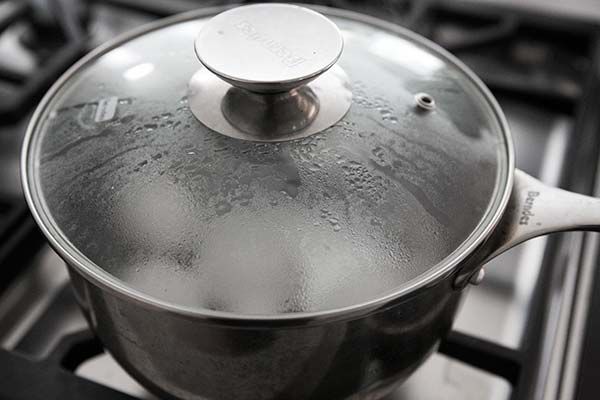
When you start boiling water with the cover on, it comes to a rapid boil. Covering your pot allows the heat to escape more quickly. If it’s leaving the pot faster, it’s indicating that it’s rising to a boil faster. Turn the heat down to low and remove or partially remove the lid once the pot has reached a boil.
Reduce the heat to the lowest setting possible while keeping the water boiling. Maintaining a high temperature is essentially a waste of energy, and you’re also setting yourself up for a boil over.
It’s also crucial to avoid removing the lid too rapidly.
Don’t remove the lid from boiling water too rapidly, just as you wouldn’t remove the radiator cap from an overheated car.
What’s the most effective approach to avoid a boil over?
When water boils, it produces steam.
The pressure rises as more water boils and more steam is created. When there are starchy substances in the water, such as potatoes or rice, the surface tension of the water is insufficient to hold back the force of rising steam.
This makes the bubbles more pliable, resulting in foam.
This prolongs the life of the bubbles, causing them to accumulate. The foam bubbles will eventually burst, causing a massive mess.
When you require boiling water, you don’t always need it to be at a rolling boil. Controlling the boil over should be as simple as reducing the temperature. Lowering the temperature allows the water to cool and then boil to be slowed.
Remove a pot from the heat if it is on the verge of boiling over. It won’t erupt like a pressured radiator cap, but it could boil over and spill all over your stovetop.
Blow on it as if it were a cup of coffee if required. This should allow you enough time to reduce the heat to maintain a boil, but not to the point of boiling over.
Using a larger pot is one practical approach to avoid a boil over. Use a larger pot the next time you want to prepare your favorite soup, even if you think it’s “too big.” If at all possible, strive to use less water.
If you’re going to cook something starchy like potatoes, rice, or pasta, give it a good rinsing first. This will assist in eliminating some of the starch that causes foaming and eventual boiling over.
Is it possible that I answered all of your queries about how to keep the soup from boiling over?
This article talked about the mess that a boiling pot can make in some common kitchen scenarios. We also discussed several wives’ tales on how to avoid a boil over. We discussed using wooden spoons to cover pots, adding salt, and whether or not boil over preventer discs are effective. Most importantly, we addressed the issue of keeping your soup from boiling over. And my preferred method is to use a boil over preventer disc.
Let’s hope we never have to clean our stovetops again!











